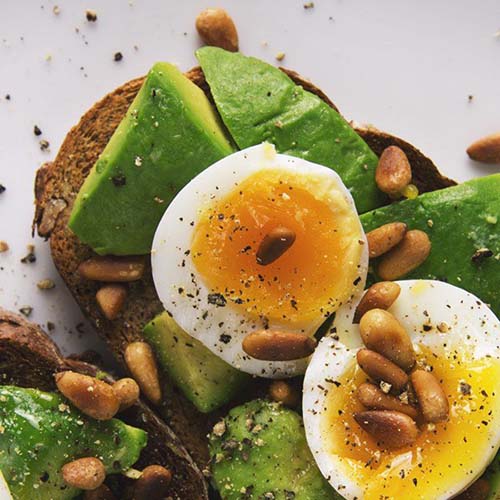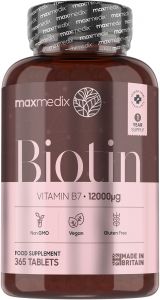Vitamin B7
Biotin (vitamin B7) is a vitamin that can be found in foods such as eggs, milk, and bananas. A lack of biotin can result in hair thinning and a rash on the face.

Vitamin B7
Biotin (vitamin B7) is a vitamin that can be found in foods such as eggs, milk, and bananas. A lack of biotin can result in hair thinning and a rash on the face.
Overview
Biotin (vitamin B7) is a vitamin that can be found in foods such as eggs, milk, and bananas. A lack of biotin can result in hair thinning and a rash on the face.
Biotin is an essential component of enzymes in the body, which break down substances such as fats, carbohydrates, and others. Because there is no good test for detecting low biotin levels, it is usually diagnosed based on its symptoms, which include thinning hair and a red scaly rash around the eyes, nose, and mouth.
Biotin is used to treat a deficiency in biotin. It’s also commonly used to treat hair loss, brittle nails, and other conditions, but there’s no good scientific evidence to back up these claims. Some lab tests may be affected by biotin supplements. If you are taking biotin supplements and need blood tests, consult your doctor.
Source
Sources of Vitamin B7
-
Baker’s yeast
-
Wheat bran
-
Organ meats
-
Cooked, whole eggs
-
Oysters
Here are some biotin-rich foods and amounts:
- 3 ounces of cooked liver: 30.8 mcg
- 1 large, whole cooked egg: 10 mcg
- 3 ounces of canned pink salmon in water: 5 mcg
- 1 ounce of cheddar cheese: 0.4 to 2 mcg
- 1 cup of sweet potato: 4.8 mcg
- 3 ounces of cooked hamburger patty: 3.8 mcg
- 1 cup roasted sunflower seeds: 9.6 mcg
- 1 cup of roasted almonds: 6 mcg
Biotin is found in a variety of foods, including fruits and vegetables.
Uses & effectiveness
Biotin supplements are available alone, in combination with B vitamins, or as part of a multivitamin.
Biotin supplements are used to prevent or treat:
- Hair loss
- Brittle nails
- Seborrheic dermatitis is a skin condition that affects infants
- Diabetes
- Mild depression
Those with biotinidase deficiency typically begin with a daily dose of 5 to 10 mg.
Those who do not have this genetic condition should first try to get enough biotin from their diet, as it increases the intake of other beneficial nutrients that work in tandem with it.
It is always preferable to get nutrients from food first, and then from supplements as a backup if necessary.
Before taking supplements, always consult with your doctor.
Side Effects
Biotin in high doses has no known toxicity, but it may interact with certain drugs, herbs, and supplements.
When biotin is combined with alpha-lipoic acid, the body may be unable to absorb either. The same is true for vitamin B5, also known as pantothenic acid.
Some medications that are broken down by the liver, such as clozapine (Clozaril), haloperidol (Haldol), olanzapine (Zyprexa), and others, may interact with biotin supplements.
Biotin is likely safe for most people when taken orally in doses of up to 300 mg daily for up to 6 months. However, it is more commonly used in lower doses of 2.5 mg per day.
When applied to the skin, biotin is probably safe for most people when used in cosmetic products containing up to 0.6 percent biotin.
If you get any side effects, talk to your doctor, pharmacist or nurse. This includes any possible side effects not listed on this page. In the UK you can also report side effects directly to the Yellow Card Scheme By reporting side effects you can help provide vital information on the safety of this medical supplement.
Is this medicine suitable for you?
Take precautions:
- Pregnant and breastfeeding. When used in the recommended amounts during pregnancy and breast-feeding, biotin is most likely safe.
- Children. When taken orally, biotin is most likely safe. It has been used safely in doses ranging from 5 to 25 mcg per day.
- A genetic condition in which the body is unable to process biotin (biotinidase deficiency). People with this condition may have low biotin levels and require a biotin supplement.
- Kidney dialysis. People on dialysis may have low levels of biotin and may require a biotin supplement.
- Smoking. Smokers may have low biotin levels and require a biotin supplement.
- Laboratory tests. Taking biotin supplements may interfere with the results of a variety of blood tests. Biotin can cause test results to be falsely high or falsely low. This could result in missed or incorrect diagnoses. Inform your doctor if you are taking biotin supplements, especially if you are scheduled for lab tests. You may need to discontinue taking biotin prior to your blood test. Most multivitamins contain trace amounts of biotin that are unlikely to interfere with blood tests. However, consult your doctor to be sure.
Consult your doctor
Dosage
Small amounts of biotin are found in foods such as eggs, milk, and bananas. Biotin does not have a recommended daily allowance (RDA) because there is insufficient evidence to establish one.
However, the Department of Health and Social Care advises that taking 0.9mg or less of biotin per day in supplements is unlikely to be harmful.
During pregnancy, the same amount should be consumed. Breast-feeding mothers should consume the same amount on a daily basis. The amounts recommended for children vary according to their age. Speak with your doctor to determine the best dose for your specific condition.



